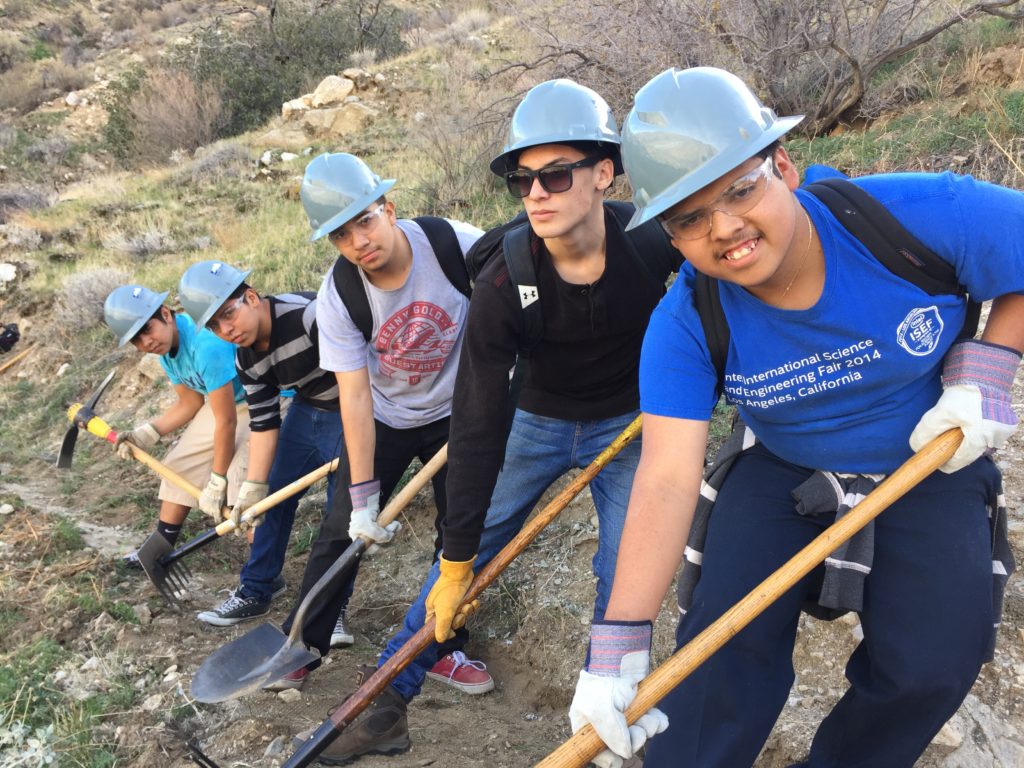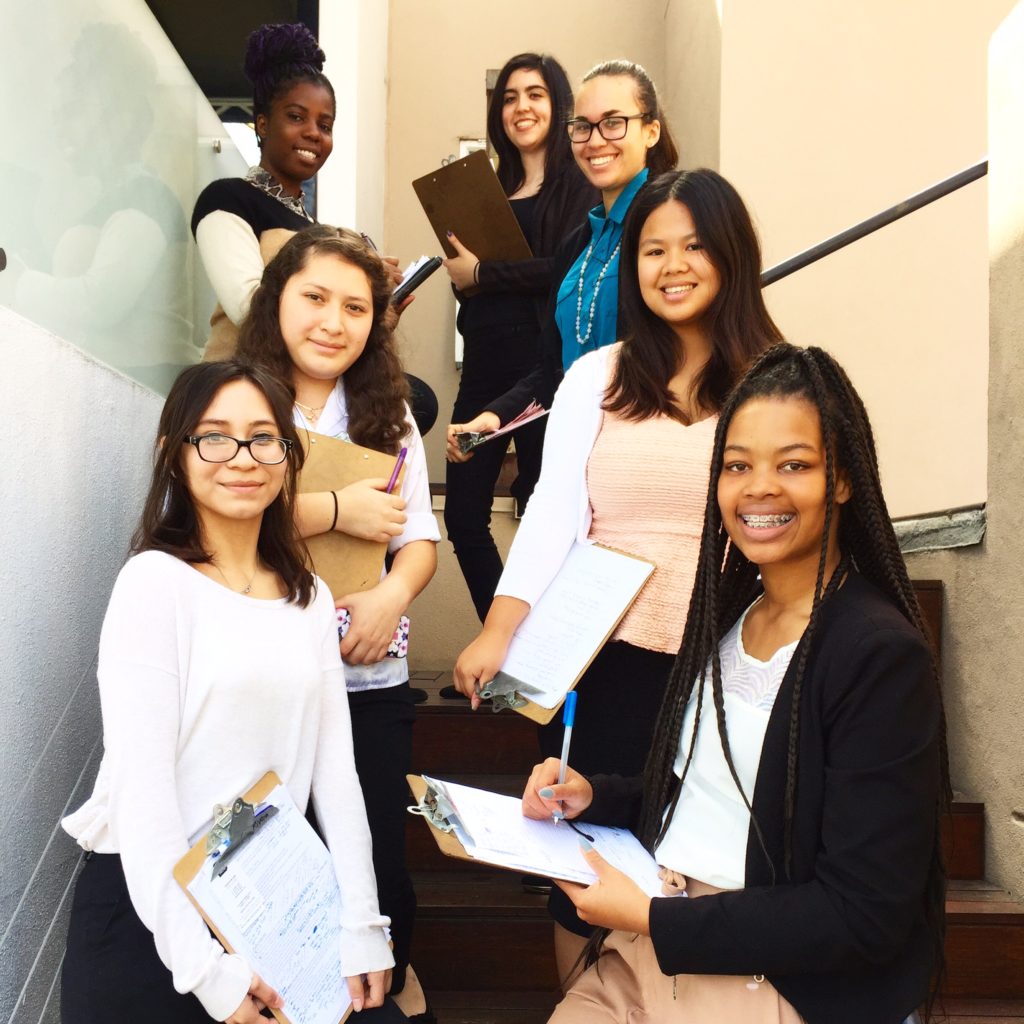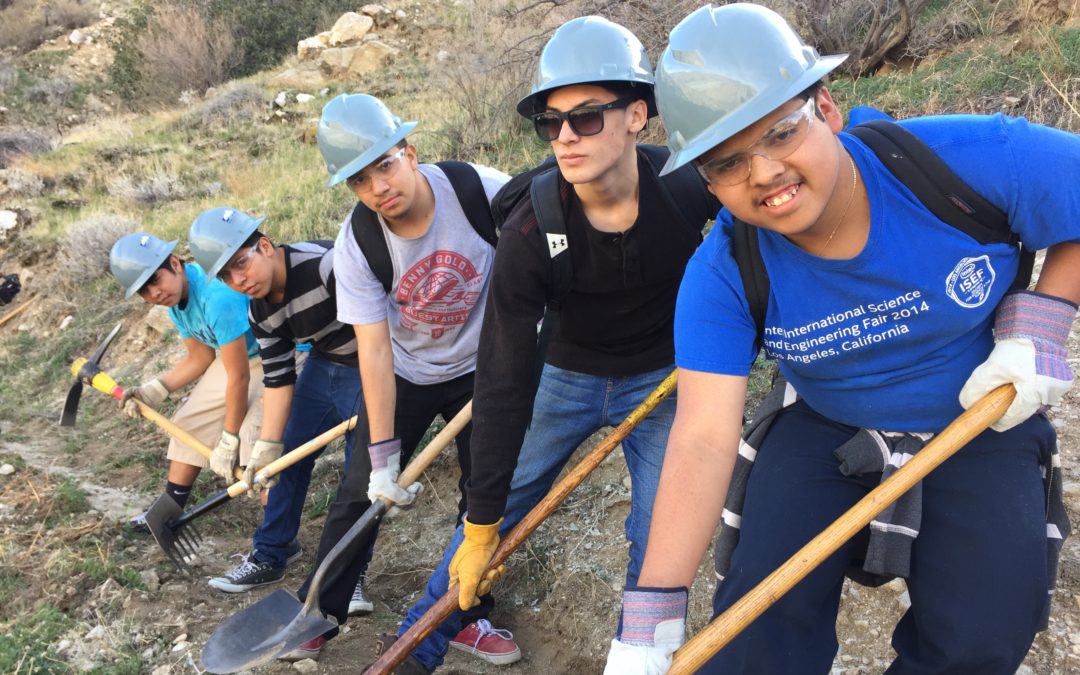By. Alison Suffet-Diaz, Executive Director, Environmental Charter Schools
“A few years ago, I was coaxed by my Assistant Principal into getting into a van and driving into a place in the mountains that I’ve never been before to push around dirt on a trail with a bunch of upperclassmen. Of course, as the only freshman at the time I was absolutely thrilled (cue sarcasm) to have a boring weekend with people I didn’t know in a hot, dusty, and sweaty place where there was no shower or no bathroom.” The audience chuckled in response to what is seemingly every teenager’s nightmare. “But aside from trail dirt, I went home with some lessons.”
Paolo Juarez was one of four students from Environmental Charter High School (ECHS) who had flown to Washington, D.C. to “Hike the Hill” to share their experiences working on the Pacific Crest Trail, a long-distance trail spanning from Mexico to Canada through California, Oregon, and Washington. They spoke to a roomful of policymakers that included representatives from the Department of the Interior and the Forest Service, as well as local representatives U.S. Congresswomen Maxine Waters and Loretta Sanchez, among others. Since 2007, groups of ECHS students have taken weekend “work trips” every semester to the Pacific Crest Trail in the Angeles National Forest and San Bernardino Mountains to maintain existing trails and work on building new trails. Last year alone, ECHS students devoted 900 hours to the project with the Pacific Crest Trail.

ECHS Students volunteering on the Pacific Crest Trail. Last year alone, ECHS students devoted 900 hours to the project with the Pacific Crest Trail.
Photo | Environmental Charter Schools
Founded in 2001, Environmental Charter Schools (ECS) is an innovative network of free public schools serving South Los Angeles. The mission of ECS is to create and deliver vibrant, innovative, interdisciplinary learning opportunities using the environment to engage students and connect them to the wider world. Since its inception, ECS has provided students with unique learning experiences that utilize environmental service learning to inspire students to find authentic meaning in their studies.
At ECS, the founding team researched factors associated with successful educational schools, and formulated what became the ECS best practice model – a small community school paired with an interdisciplinary curriculum and authentic assessment, environmental and experiential learning, and community partnerships. These best practices inform every element of the ECS experience and have contributed to its success. ECS grew from 100 students and four classrooms to a high school and two middle schools, and serves more than 1,000 students each year. ECS campuses are alive, with more than 100 varieties of fruits and vegetables, a living stream, school-wide composting, and solar-powered greenhouses. They offer students and teachers a living platform to explore campus-wide solutions to current real world challenges, and the results are students who are prepared for college, motivated to continue learning, and have a desire to positively contribute to their community.
Paolo continues, “I learned a lot with the people I was with because we were able to have genuine interactions. It became apparent to me through my time there that it mattered less that we were individuals and distinct but mattered more that we were a team, united by a common cause and a common passion for the environment. We were a part of something bigger than us. To honor that we have to set aside our differences. I learned a lot about myself and my determination.”
ECS students speak passionately about the importance of outdoor education because they understand firsthand the impact of these experiences on their personal development and academic success.
“Ultimately, this weekend was a catalyst. A spark that ignited my passion for the environment and set me on a path of more environmental service opportunities. In the last 3 years, I’ve been involved with the Green Ambassadors Internship and have done meaningful work in my community to share with urban residents about the environment and sustainability. I wrote my senior thesis on environmental education and engagement among the youth and the necessity of providing these opportunities in schools and getting people out there.”
At ECS, all students take a Green Ambassadors environmental service-learning class where they learn about food, waste, water, energy, and environmental justice, and take action locally to connect with and improve their community. Beyond that, 10th and 11th graders can take part in the after-school internship where they educate their larger community and serve as “junior consultants.” While conducting sustainability audits, students take their previous knowledge about the California drought, energy efficiency, and waste reduction methods such as composting and recycling to help local businesses reduce their carbon footprint and offer recommendations.

Green Ambassadors Interns conduct a sustainability audit with Venice-based B-corporation, MaCher.
Photo | Environmental Charter Schools
Community partnerships help teachers harness the power of adventure and discovery to engage students in action, leading students to become active community participants. Above all, partnerships provide opportunities to translate students’ academic skills into real-world professional experience, developing young environmental stewards who are well-versed in sustainability no matter what career they go into.
When students feel powerful and become the drivers of change, we see them succeed. This year, 99.6% of our high school seniors completed their A-G University requirements and a full 97% of ECHS graduates were admitted to a four-year college or university. Most of our students are first and second-generation immigrant youth of color and are the first in their families to go to college.
Upon returning to Los Angeles, Paolo and his peers received a letter from The Land Trust Alliance in which a representative shared, “I’ve sat in literally hundreds of government meetings and listened to thousands of people talk about the outdoors and trails and the environment, and [ECS students’] presentations were the best I have ever heard. [ECS students’] words had a tremendous impact – not just on me, but on everyone in the room. Thank you for taking the time to come to DC and make a difference in the world!”
At ECS, we believe that when we allow our students to be the authors of their own narratives, they surpass our wildest expectations. They are not just the future or the next generation, but the superheroes and leaders of today.
About the Author
Alison Suffet Diaz is the Founder and Executive Director of Environmental Charter Schools (ECS), a growing network of schools that provides a meaningful education for youth in the underserved communities of South Los Angeles. A teacher and lawyer by training, and mother at heart, Alison set out to create a different kind of educational experience for students, which has evolved into a model for schools across the country. Environmental Charter High School is ranked in the top 3% of U.S. public high schools by U.S. News & World Report, and was chosen as one of three national finalists in President Obama’s Race to the Top Commencement Challenge. Alison is most proud of ECS’s graduates who have gone on to complete their college education. 96% of ECS graduates are accepted into four year colleges and universities. Alison serves on the Board of Directors for the Green Schools National Network, is an Advisory Board Member for the Antioch Teacher Education Program, and is a Senior Fellow for the City Scholars Foundation.

